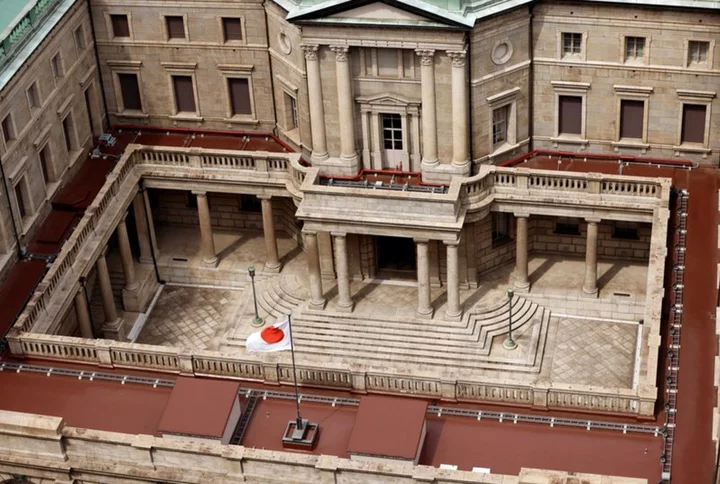By Leika Kihara
TOKYO The Bank of Japan is expected to raise its inflation forecasts this month to show prices exceeding its 2% target for two straight years, three people familiar with the matter said, complicating its efforts to keep monetary policy accommodative.
In fresh quarterly growth and inflation forecasts due at its two-day policy meeting ending on Oct. 31, the BOJ is set to raise its core consumer inflation forecast for the year ending in March 2024 to near 3% from the current 2.5% projection made in July, the sources said.
It is also seen upgrading its forecast for 2024 from the current 1.9%, to at or above 2.0%, as recent rises in oil costs are expected to push up utility bills, they said.
The revisions would heighten scrutiny on the BOJ's argument that it can keep monetary policy ultra-loose because "sustained" achievement of its 2% target has yet to come in sight.
It would additionally raise pressure on the BOJ to lift its 1.0% cap on the 10-year government bond yield set just three months ago, an option some in the central bank do not rule out as a possibility.
"The BOJ may upgrade its price forecasts, but probably wants to keep its easy-policy framework intact for now. What it could do, instead, is to raise the cap and explain it as aimed at making the framework more flexible," said Naomi Muguruma, senior market economist at Mitsubishi UFJ Morgan Stanley.
"But doing so could put the BOJ's accountability on the line as actual rates would move too far away from its 0% target."
BOJ governor Kazuo Ueda is seeking to unwind the complex monetary stimulus deployed by his predecessor Haruhiko Kuroda over the past decade, which is blamed for causing a range of distortions in financial markets.
However, the task of shifting away from extremely low interest rates is complicated by risks of triggering sharp and disruptive swings in capital markets if investors begin to anticipate a policy tightening.
While Ueda has sought to reassure markets that no change in policy is imminent, creeping inflation and pressure on rising Japanese yields are making it increasingly difficult for the BOJ to maintain its yield curve control (YCC) policy.
"Even if the inflation forecasts are upgraded, that alone won't trigger a policy shift," one of the sources said. "What's more key is whether a positive wage-inflation spiral becomes embedded in Japan," another source said.
Many in the BOJ are wary of phasing out stimulus too soon, particularly if the overshoot in inflation is caused mainly by one-off factors like fuel, the sources said.
Their preferred approach is to wait until there is more certainty Japan's economy can weather headwinds from slowing overseas demand, and allow companies to keep hiking wages next year and beyond, they said.
So far, the signs are mixed. Japan's largest labour organisation Rengo is planning to ask for a total pay hike of more than 5%, public broadcaster NHK reported, heightening prospects of solid wage growth next year.
But global uncertainties, such as soft Chinese growth and the recent Middle East crisis, could hurt corporate sentiment and discourage firms from hiking pay, some analysts say.
Market factors may not leave the BOJ much time to stand pat.
Reflecting Japan's sticky inflation and recent rises in U.S. Treasury yields, the 10-year JGB yield hit a multi-year high of 0.815% on Wednesday, approaching the 1.0% hard cap the BOJ set in July.
"YCC becomes a challenging framework to sustain when inflation starts rising," said one of the sources. "It's hard to keep capping yields when they are rising reflecting improvement in the economy."
Under YCC, the BOJ guides short-term rates at -0.1% and the 10-year bond yield around 0%. In July, it raised the de-facto cap on the 10-year yield to 1.0% from 0.5% to allow long-term rates to rise more reflecting increasing inflation.
In a Reuters poll in September, most analysts said they expect the BOJ to abandon YCC by the end of 2024. A majority of them also project an end to negative rates next year.
(Reporting by Leika Kihara; Additional reporting by Takahiko Wada; Editing by Sam Holmes)

